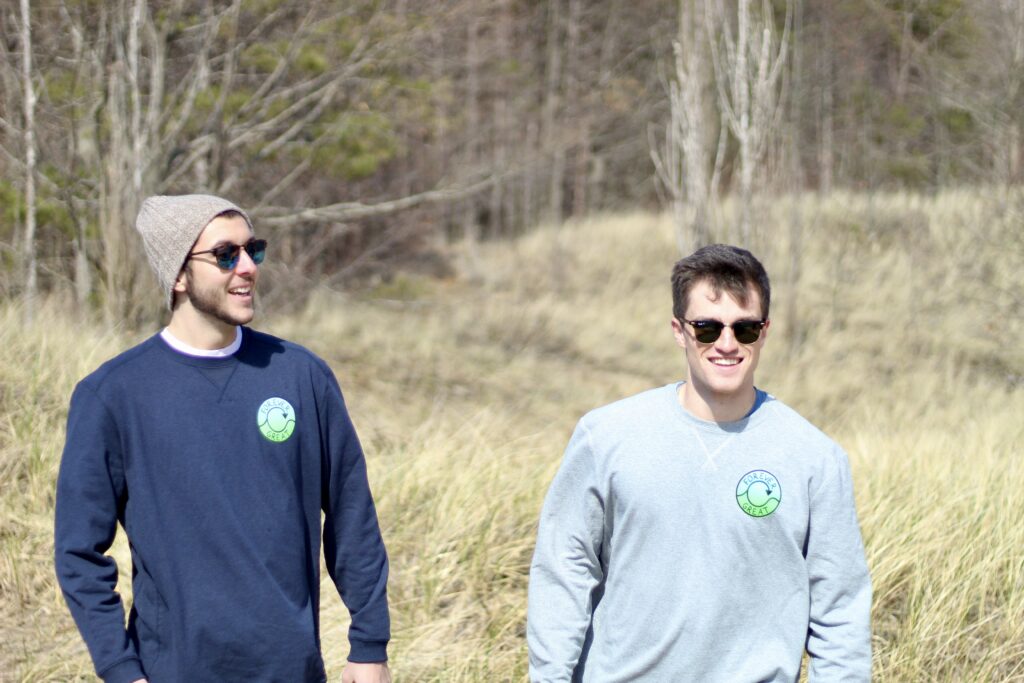Beachcombers walking along the shoreline of the Great Lakes look for interesting rocks (Petosky stones, if you’re in northern Michigan), beach glass for jewelry, and driftwood in interesting shapes. Often, a birthday balloon will wash up with lake weed. And invariably there will a plastic bottle and other litter.
While hiking along the Lake Michigan shore near Grand Haven, Michigan, last fall, Chad Howell and Jack Kleinrichert saw a cluster of plastic and litter. Longtime Michigan residents, litter along the lakeshore wasn’t an unusual siting, but this was an “aha” moment for the two Grand Valley State University business students. “We’re both into the outdoors,” Howell said. “Some of it (plastic) was bottles with other forms of litter and other was really small chunks that had been broken out. I could tell a lot of it had been washed ashore because of the size of it. We saw the plastic, and both of us, being from Michigan and experienced the Great Lakes for our whole lives, we kind of knew that this was an issue and pollution was real, but that was an ‘aha’ moment for us. We started to pay close attention to it.”
The two returned to their dorm at Grand Valley and began researching litter in the Great Lakes. They couldn’t find much except for a research study from the Rochester Institute of Technology that concluded that 22 million pounds of plastic enters the Great Lakes annually — half of it in the Lake Michigan region. The need to act that led to an idea for a social enterprise: repurpose plastic as clothing and use that as a platform to educate people about the waste that’s polluting the lakes. Although their current focus is Lake Michigan, their vision is the broad expanse of the Great Lakes; hence the product name, Forever Great.
Howell grew up in Southeast Michigan and Kleinrichert in Northwest Michigan. Coming together at Grand Valley, the two found themselves living in adjacent dorm rooms. One of their shared pastimes was watching Shark Tank and conceiving “not-so-good” business ideas, according to Howell. With both having an interest in the natural environment and a social consciousness, this was a winner. “I’ve always want to make a difference in something more than a regular business. Business should be used as a tool for making change and promoting good causes.” Their mission statement places social good ahead of profit: “To preserve the Great Lakes by raising awareness of plastic pollution in the Lakes, being apart of the solution within the clothing industry, and becoming a voice for change.” Forever Great was launched last month on Earth Day.
Howell and Kleinrichert formed a business relationship with a company in Charlotte, North Carolina, that produces polyester yarn that’s woven into designs created in Michigan. They enlisted another student to provide the design for a t-shirt, and production ensued. A fourth student joined as a public relations specialist.
As a social enterprise, the social entrepreneurs not only wanted to make money doing something contributing to the social good, they wanted to support an organization that was educating and advocating on a broader scale. They made a commitment to share eight percent of their profits with Alliance for the Great Lakes, based in Chicago. They also plan to promote the organization’s beach clean-up efforts.
Living in the Great Lakes region has shaped Howell in a way he finds difficult to describe. It has something to do with having an acute awareness of the vast fresh water surrounding the Michigan peninsula and beyond. “Growing up in the summer I would spend a lot of time with my family traveling around the state (then) hunker down in the winter,” Howell said. “Experiencing the lakes…helped make me the person I am today.” That includes “being out in nature and feeling one with the environment. It gives you the perspective that we’re small; the world is very large. That means a lot to me.” There’s something about being near large bodies of fresh water that’s different that an ocean. “It’s very unique that we are surrounded by these great, fresh bodies of water.” And, from a Midwestern perspective, there are the seasons…
Forever Great plans add products and eventually distribute them to markets throughout the Great Lakes region. It will continue manufacturing goods at the plant in Charlotte until they can develop the capacity in Michigan. And when they do, they will be also be conscious about the by-product of the repurposed plastic — sustainability being an ongoing process. Every Forever Great t-shirt includes a sticker stating, “ecofriendly.”
Post written by Dennis Archambault
Photo: Jack Kleinrichert (left) and Chad Howell (right)
